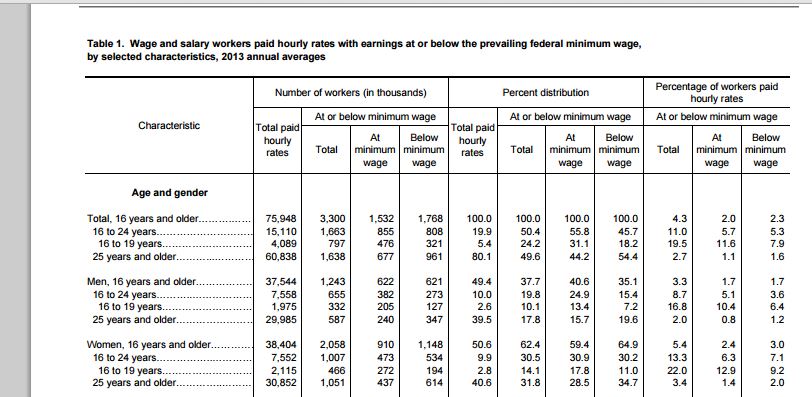Robert Reich is telling us:
Some opponents say minimum wage workers are teenagers, seeking some extra pocket money.
WRONG!
About half of minimum wage workers are 35 or older, most are women and many are key breadwinners for their families.”
OK, well, let’s see what the government itself tells us from the raw data:
By this data, only half of minimum wage earners (or who earn less) are over the age of 25. So it can’t be the case that half of the workers are 35. Maybe Mr. Reich misremembered, or misspoke. But even giving him the benefit of the doubt, he is totally blowing off the obvious point we made a few weeks ago – that even if EVERY minimum wage worker were trying to support a family, that’s only a tiny slice of the people we are interested in helping. He is also blowing off a very significant research paper from Tom MaCurdy a few months back:
About 35 percent of the total increase in after-tax benefits goes to families with income less than two times the poverty threshold, a common definition of the working poor or near-poor; nearly 13 percent goes to families principally supported by low-wage workers defined as earning wages at or below 117 percent…of the new 1996 minimum wage; and only about 14 percent goes to families with children on welfare.
Unlike most public income support programs, increased earnings from the minimum wage are taxable. Over 25 percent of the increased earnings are collected back as income and payroll taxes…Even after taxes, 27.6 percent of increased earnings go to families in the top 40 percent of the income distribution.
There’s lots of other goodies in the video, I particularly like this one:
more money in people’s pockets means more demand for goods and services, which means more jobs not fewer jobs.
OK, really. How do you like your window broken, shattered or smashed?
And here is perhaps the best one:
Studies have also shown that when the minimum wage is raised, more people are brought into the potential pool of employees, so employers have more choice of whom to hire and that cuts down on turnover and helps employers save money.
Now that really is an incredible observation. Again, assume all of the studies are right. What are the implications of this observation?
- So, firms DO want to save money. If they DO want to save money, then perhaps imposing higher money labor costs is something they have considered already? Or are all firms just so hateful of low-wage workers that they’d prefer to incur larger expenses overall via high turnover and low wages than they would get from higher wages and low turnover? Why are they irrational in that particular way, particularly when these employers often sell to these very same customers?
- So, employers have CHOICES about whom to hire? Great, so what this argument amounts to is that employers are going to be more selective – which is great if you are a top talented low-wage worker, and really crappy if you are not. In other words, the shift of workers will be into those who are already going to have better career prospects – exactly the point minimum wage “opponents” have been making for years, and now Reich is using this as a defense of it?
- So, MORE people are going to be seeking jobs? I don’t disagree. But couple that with (2). So Reich says labor turnover will be reduced. He also says firms want to save money, so we know they are not goingt to hire MORE workers. We can safely assume that firms will hire no more workers than before, and that there will be less people moving out of and hence into these low skill jobs, hence reducing the opportunities for people to gain entry level experience. And since Reich himself has argued above that no new jobs are created AND that more people will be seeking jobs, he is saying, contra to “the empirical evidence” that there WILL be unemployment created by the minimum wage increase. So does Mr. Reich wish to explain himself. Do all of these new entrants drop out of the labor force? Why aren’t they showing up as unemployed?
So, we have a video here, by an esteemed intellectual, that contains a “misrememberance” and several contradictions, and this in just a short 30 second stint of the video. Is there a charitable view to be taken?
Read my old stuff, I actually now wish to see this enacted. I certainly stand to be better off once the wage is raised, and since I am a greedy, heartless, paid-for economist, I am surely only interested in what is best for me. So I want to see this wage raised. I’ll remind readers again that I employ zero people and pay these non-people zero dollars an hour. How decent of me.
